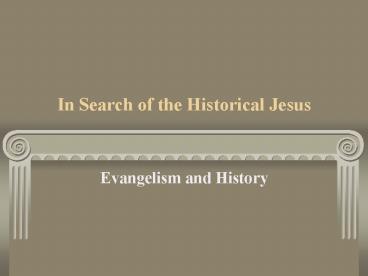In Search of the Historical Jesus - PowerPoint PPT Presentation
1 / 23
Title:
In Search of the Historical Jesus
Description:
New Testament Sources: Acts of the Apostles, Paul's Letters, the Synoptic ... show affinities with the Gnosticism of the Qumran material (Dead Sea Scrolls) ... – PowerPoint PPT presentation
Number of Views:130
Avg rating:3.0/5.0
Title: In Search of the Historical Jesus
1
In Search of the Historical Jesus
- Evangelism and History
2
Dispute on the status of individual passages
seems virtually endless a saying or story that
evinces a clear ring of authenticity for one
scholar often displays to another, just as
unambiguously, the earmarks of ecclesiastical
origin.Paula Fredriksen, From Jesus to Christ
3
(No Transcript)
4
Caravaggio, The Deposition (1604)
5
Giuseppe Maria Crespi The Holy Family Ca. 1735
6
The Crucifixion and the Annunciation Flanders
tapestry Ca. 1500-1525
7
Raphael Sanzio The Transfiguration
8
The Nature of the Evidence
- New Testament Sources Acts of the Apostles,
Pauls Letters, the Synoptic Gospels (Matthew,
Mark, Luke), Gospel of John - Evangelical, religious, proselytizing texts
- All removed from the historical figure by at
least a generation - Scantiness of non-Christian Sources (Tacitus,
Josephus)
9
The intuition of earlier scholars was sound
what really happened during Jesus ministry is
not recoverable from the evangelical descriptions
of what happened. But by examining these
descriptions in light of our knowledge of Jesus
historical context, we can establish with
reasonable security what possibly happened, what
probably happened, and what could not possibly
have happened.Paula Fredriksen, From Jesus to
Christ
10
The Historical Kernel
- Jesus Baptism by John the Baptist
- Crucifixion (Pontius Pilate)
- Message? Love, Non-Resistance, Poverty
- Crucifixion Roman Punishment for Sedition (cf.
Spartacids along the Appian Way)
11
Palestine in New Testament Times
12
Only Inscriptional Evidence Attesting Pontius
Pilate, From Caesarea
13
The church, as evidence by all the various
evangelical efforts to mitigate the awkwardness
(e.g., John did not really want to baptise Jesus,
but Jesus insisted Pilate did not really want to
execute Jesus, but the Jews and finally even
Jesus insisted), was stuck with these two
facts.Paula Fredriksen, From Jesus to Christ
14
Two significant facts intervene between the
lifetime of Jesus and the composition of the
gospels first, Rome had destroyed Jerusalem
and, second, the majority of Jews had declined to
perceive Jesus as a messiah.Paula Fredriksen,
From Jesus to Christ
15
Jews, not Romans, the gospels argue, were
hostile to Jesus Jews, not Romans, were
threatened by his message Jews, through Romans,
engineered his death and all had been long ago
predicted in scripture.Paula Fredriksen, From
Jesus to Christ
16
Saint Paul (Saul of Tarsus)
- Hellenized Pharisaic Jew and Roman Citizen
- Dramatic Conversion, Vision of Christ on the Road
to Damascus (36 CE?) - Crucial Importance for Christianity
17
(No Transcript)
18
Pauls Contributions
- Realized Eschatology (the promised revolution has
occurred) - Universality of the Word Gentile Mission (wide
audience organization of proselytism) cf. Rom.
15 214 224 930-33 1111-13 and 17-26
159-12 and 15-18 and 27 1626 - Grace a new metaphysical dispensation between
God and humans which begins in historical time
with the Crucifixion cf. Rom. 321-26 - Sin only expiated through the Sacrifice of the
Son, which amounts to the emancipation of the
human race and freedom from death cf. Rom. 512
and 2 714 and 21 89-11
19
Jesus Christ, our Lord, through whom we have
received grace and apostleship to bring about the
obedience of faith among all the Gentiles for the
sake of his nameRom. 15
20
Since all have sinned and fall short of the
glory of God they are now justified by his grace
as a gift, through the redemption that is in
Jesus ChristRom. 323-24
21
Just as sin came into the world through one man,
and death came through sin, and so death spread
to all because all have sinnedsin was indeed in
the world before the law, but sin is not reckoned
when there is no law.Rom. 323-24
22
Formation of the Canon Who Decides?
- No consensus in early Church (cf. Pauls conflict
with the community in Jerusalem) - Gospels of John (canonical) and Thomas (not
canonical) show affinities with the Gnosticism of
the Qumran material (Dead Sea Scrolls) - Gnostics Knowledge Salvation knowledge can be
attained by the individual the kingdom of God is
within - Organization and Developing Church Bureaucracy
Need for Hierarchies
23
Triumph of Pauline Christianity and the Jewish
Revolt (66-73 CE)
- Destruction of the Temple at Jerusalem in 70 CE
as a prerequisite for Pauls posthumous success
(Paul probably died in the Neronian persecution
in 64 CE) - Dissociation from Judaism Jews as the villains
of the Synoptic Gospels and Gospel of John































